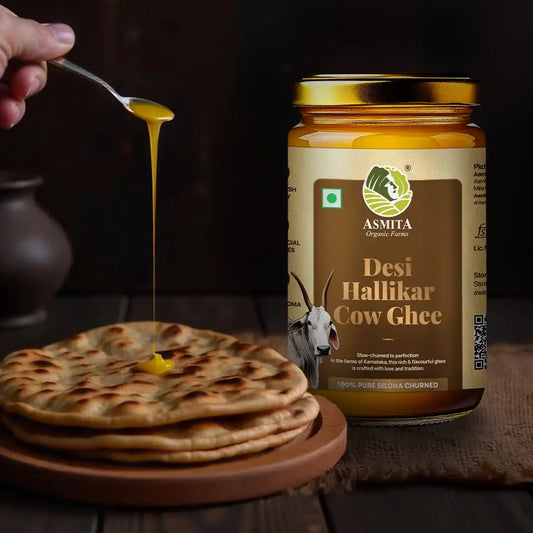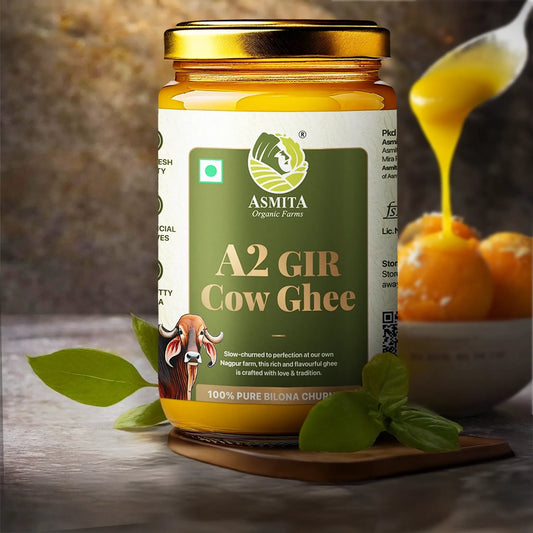For generations, Indians have relied on cow ghee in their kitchens. Due to its rich aroma, ability to withstand high heat, and Ayurvedic health benefits, ghee is commonly associated with vitality and nourishment.
As people now pay more attention to their health, questions like ‘is cow ghee good for cholesterol’ and the heart have surfaced. Does ghee raise your risk of heart problems? Or have we misunderstood this ancient superfood?
Let’s explore the myths and facts around cow ghee and heart health.
Table of Contents
- Is Cow Ghee Good for Cholesterol?
- Nutritional Breakdown of Cow Ghee
- How Ghee Affects Cholesterol Based on Modern Science
- Ghee vs Refined Oils for Cholesterol
- How Much Ghee is Safe Per Day?
- Expert Opinions
- Bottom Line
- FAQs
Is Cow Ghee Good for Cholesterol?
For a long time, it was believed that the saturated fat in cow ghee could increase the amount of LDL cholesterol in the body. However, recent investigations are casting doubts on this general theory.
Butyric acid, present in ghee, may help support your gut, fight inflammation, and have a beneficial effect on cholesterol metabolism. So, consuming moderate amounts of cow ghee may improve your overall health, particularly when it comes to ghee and HDL levels, which may actually see a positive impact.
Nutritional Breakdown of Cow Ghee
Here’s a nutritional breakdown of two types of A2 cow ghee from AsmitA Organic Farms.
- Energy - 898 Kcal
- Total Fat (g) - 99.77
- Saturated Fat (g) - 63.92
- Trans Fat (g) - 0.0
- Omega 6 Fatty Acids (g) - 3.11
- Monounsaturated Fatty Acids (g) - 32.97
- Polyunsaturated Fatty Acids (g) - 3.11
- Cholesterol (mg) - 253.4
- Sodium (mg) - 2.35
- Vitamin A (mg) - 0.82
- Energy - 898 Kcal
- Total Fat (g) - 99.8
- Saturated Fat (g) - 60.47
- Trans Fat (g) - 0.0
- Omega 6 Fatty Acids (g) - 3.92
- Monounsaturated Fatty Acids (g) - 35.41
- Polyunsaturated Fatty Acids (g) - 3.91
- Cholesterol (mg) - 231
How Ghee Affects Cholesterol Based on Modern Science
Previously, ghee and similar saturated fats were considered major contributors to elevated cholesterol and heart disease. However, recent studies reveal that there’s more to the story.
The 2018 study in the European Journal of Clinical Nutrition reported that there is no clear evidence that affirms the question, ‘does ghee increase cholesterol?’. Additionally, current scientific research suggests that consuming traditional ghee in moderation does not increase cholesterol levels and may actually benefit the good cholesterol.
Since ghee contains conjugated linoleic acid (CLA) and antioxidants, it may help reduce two key causes of heart disease: inflammation and oxidative stress. This makes the conversation around ghee and LDL cholesterol much more nuanced than previously believed.
Ghee vs Refined Oils for Cholesterol
Here’s a brief comparison of ghee and refined oil:
|
Features
|
Cow Ghee
|
Refined Oils
|
|
Processing
|
Natural, traditional
|
Highly processed
|
|
Smoke Point
|
Approx. 250°C (high)
|
Approx. 200°C (varies by oil)
|
|
Trans Fats
|
None
|
Possible in hydrogenated forms
|
|
Nutrient Density
|
High (fat-soluble vitamins, CLA)
|
Low
|
|
Stability
|
Very stable for cooking
|
Can break down into harmful compounds
|
|
Cholesterol Impact
|
May raise HDL, neutral LDL
|
May raise LDL, lower HDL (with trans fats)
|
|
Flavour
|
Rich, nutty
|
Neutral or bland
|
How Much Ghee is Safe Per Day?
Generally, adults, both men and women, are recommended to consume 2 to 3 teaspoons of ghee per day. It can go up to 4 tsp for healthy individuals with an active lifestyle.
Try not to overdo it with fat in fried meals, and don’t place several types of fat together at one time. Anyone with a history of heart or cholesterol problems should consult a dietitian before incorporating ghee into their daily diet.
Expert Opinions
Health experts often hold differing views on this topic. As per some nutrition experts, the reputation regarding ‘is ghee bad for cholesterol’ is unfair. It helps promote healthy digestion and, with proper consumption, supports heart health.
The American Heart Association suggests that it is healthier to limit saturated fats, but recent adjustments put more focus on the quality of your diet and types of fats. According to Ayurveda, cow ghee is believed to balance two main doshas, improve lubrication in the joints, and increase vitality.
Bottom Line
So, is cow ghee good for cholesterol? When consumed in moderation and as part of a balanced diet, the answer leans towards yes. The key lies in mindful consumption and choosing high-quality ghee that retains its natural nutrients.
Ready to add a healthy spoonful to your plate? Choose AsmitA Organic Farms’ A2 Cow Ghee, made from grass-fed Gir and Hallikar cows using traditional bilona methods. Explore our ghee collection now and bring home this time-tested superfood.
FAQs
1. Does cow ghee raise cholesterol?
There is no clear evidence that cow ghee increases cholesterol. Saturated fat in dairy may boost HDL cholesterol in those who eat too much fatty or fried foods. Cow ghee is a healthy option to fulfill the daily fat requirement of the body.
2. Is ghee healthier than oil for heart patients?
This is indeed the case for various reasons. Cow ghee is heat-stable and does not include trans fats. Still, patients should first consult with a cardiologist about switching, as every condition is unique.
3. Can cholesterol patients eat cow ghee daily?
Keeping your intake to less than a teaspoon, as directed by a dietitian, is the best approach to incorporating ghee into your diet and avoiding a cholesterol spike.













